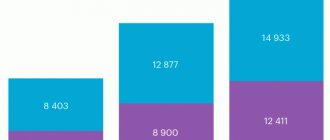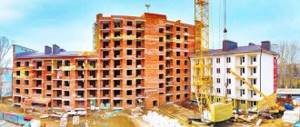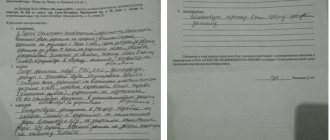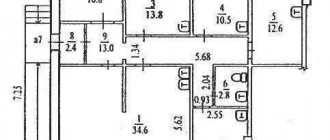Termination of DDU in court
The relationship between the shareholder and the developer is regulated by Federal Law 214.
Initially, it was adopted in order to stop the real anarchy that reigned in the shared construction market and to stop fraudulent schemes to defraud shareholders. Today, the risk of being left without money and without housing has been practically reduced to zero; the law guarantees participants a return on their invested funds in any development of events; however, unfortunately, there are no fewer unscrupulous developers. Shareholders need to know that only a DDU agreement concluded under Federal Law 214 and registered with the state in Rosreestr is a guarantor of their security. You should not transfer money to the developer before it is registered, because if the contract is not registered, it is not considered concluded. Developers often offer to first conclude a preliminary agreement, which is illegal. Violation of its terms does not entail any liability for the builders, and upon termination it does not guarantee participants a refund.
It is possible to terminate the DDU agreement after registration on legal grounds, and the shareholder can terminate relations with an unscrupulous developer on very favorable terms. There are four ways in which it is possible to terminate an equity participation agreement:
- at the initiative of the shareholder;
- by court decision;
- by mutual agreement;
- at the initiative of the developer.
It is worth noting that, regardless of the reason for the termination of the DDU, the developer must return all the money invested to the shareholder. A canceled contract must be registered with Rosreestr.
Termination of the DDU at the initiative of the shareholder is possible due to various violations committed by the developer during the construction of the house. First of all, they relate to the quality of the object. Federal law establishes strict requirements for the quality indicators of a house being rented out, which must comply with both the design documentation and the terms of the contract, as well as accepted building codes and standards.
If a discrepancy is detected and any construction defects are identified, the participant has the right to demand that the developer eliminate them absolutely free of charge. He can also make a demand to reduce the contract price or to pay for repair work if he independently takes care of eliminating the defects. All your requirements must be written down on paper and sent to the construction company.
As a rule, such requests are ignored by developers and remain unanswered, and the shareholder has a legal reason to initiate unilateral termination of the DDU. The shareholder may also refuse to further fulfill the contract on other grounds:
- the developer does not comply with the deadlines for the construction of the house and delays its delivery for more than sixty days;
- The bank’s previous guarantee expired, and the customer did not bother to conclude a new agreement with another credit institution within two weeks;
- For other legal reasons.
All of the above violations are a good reason to cancel the DDU unilaterally by the shareholder. Moreover, it is possible to sever relations with the developer without involving the judiciary. It is enough to simply send a notice of refusal to the construction company to the contract, which is terminated from the date of sending this letter.
The developer is obliged to return the equity holder’s funds and pay a penalty for the use of his money no later than 20 working days. If this does not happen, then the case cannot be avoided without a trial; it is necessary to draw up an application to the court demanding termination of the contract and the return of money from the unscrupulous developer.
Many shareholders are also concerned about the question: is it possible to terminate a share participation agreement without reason if the construction company fulfills all its obligations, and how to return money from the developer. Refusal to fulfill a contract without legal grounds is not provided for by 214 Federal Laws. In this case, you must either contact the developer and enter into an agreement with him, or find another shareholder and assign your rights to the apartment to him.
There are a number of reasons why termination of a contract for participation in shared construction at the request of the shareholder is possible only through the court. The reasons for this are more serious violations that cannot be eliminated. These are:
- A complete stop in construction, and it is obvious that even if it resumes, the house will not be built on time.
- There have been significant changes in the design documents and the area of the apartment.
- The property and non-residential premises of the house have changed their original purpose.
Particular attention should be paid to those cases when, when signing the acceptance and transfer act, a discrepancy between the actual area of the apartment and the dimensions specified in the documents is discovered. In this case, the law allows a change in the total quadrature by 5% in both directions. Thus, the shareholder can demand termination of the contract with the developer and a refund if, as a result of measurements, it turns out that the actual square footage of the apartment has been reduced by more than 5%.
Termination of the contract through the court guarantees the shareholder not only the return of all invested money, but also the payment of a penalty for the fact that the developer used his funds throughout the duration of the contract (for citizens it is 1/150 of the Central Bank rate of the total amount of the contract for each day). In addition, the participant is entitled to compensation for expenses incurred and a 50% fine of the amount awarded by the court.
Shareholders also have their own obligations under the DDU, which they must fulfill on time - this is timely payment. Depending on the terms of the contract, it can be carried out either at a time or in parts. If there is a delay of more than sixty days, the developer, before canceling the contract, is obliged to notify the shareholder in a letter and give him the opportunity to repay the debt within thirty days.
Termination of the agreement does not relieve the shareholder from paying a penalty for late payment, which is 1/300 of the Central Bank key rate of the overdue amount for each day. In this case, the developer must return all invested funds to the participant and cannot deduct the accrued penalty from them.
Late payment is the one and only reason on which a construction company can demand termination of the contract. Can the developer terminate the DDU for any other reasons? No, he can not. Moreover, if the contract includes clauses that allow it to be canceled for other reasons, they are contrary to the law. The shareholder can safely turn to the judicial authorities if the developer decides to cancel the contract on the grounds he has fabricated.
We invite you to familiarize yourself with: The amount of penalties for violating the terms of the loan agreement
The share participation agreement can be terminated:
- due to the initiative of one of the parties;
- court;
- by agreement of the parties.
There must be grounds in cases where the initiative comes from only one party. and the second does not have the right to vote and is forced to withdraw from the agreement, even if it does not have its will.
The shareholder may decide to terminate the contract if:
- The developer was late in delivering the property by at least two months;
- the constructed object has quality defects and the developer refuses to eliminate them, reduce the cost of the contract or reimburse the shareholder for his costs associated with eliminating the defects;
- The quality of the object does not correspond to the contract. The shareholder has the right not to demand correction of defects or reimbursement of his expenses for their elimination, but to immediately terminate the contract;
- bankruptcy proceedings have been opened against the developer.
The developer has the right to terminate the LDU if:
- The DDU establishes that the shareholder pays the contract amount in one lump sum payment, but the shareholder delays this payment for more than two months, relative to the deadlines established by the DDU;
- if the DDU provides for periodic payments, the developer may demand termination if the shareholder systematically violates the deadlines for making regular payments.
A contract can be terminated through recourse to judicial assistance if:
- the developer suspends or terminates construction of the facility;
- the developer has significantly changed the design documentation;
- the purpose of the common property of the facility under construction has been changed.
The most painless and peaceful way to terminate a contract consists of the following steps:
- One of the parties sends a letter to the other with a proposal to terminate the contract by agreement. Either in the agreement of the parties or in this letter, you can set a period within which the second party must respond to the request;
- If the other party agrees to termination by agreement, the parties to the agreement will agree on a time and place of meeting to sign the termination agreement;
- The agreement is signed by the parties and officially registered in the same manner as the DDU itself was registered.
In order to terminate the DDU at the initiative of the shareholder, only a notification is sufficient. The shareholder sends the notice by mail, by registered mail with a list of the attachments.
This procedure only works when the conditions for unilateral termination of the DDU at the initiative of the shareholder are strictly observed.
Even if the developer has grounds for deciding to terminate the DDU, for such termination to be legal, he must follow the following procedure:
- At least 30 days before the proposed termination, send the shareholder an official notification that he has arrears in payments and an offer to repay the debt as soon as possible. In the same letter, the developer must warn the shareholder that otherwise he will be forced to terminate the contract. The notification is sent by registered mail with acknowledgment of delivery and a list of the contents;
- If the shareholder continues to ignore payment of the debt, and the developer has received notification that the shareholder has been served with a letter reminding him of the debt, the contract is terminated unilaterally. The DDU is also terminated if the shareholder refuses to receive a letter from the developer, which is indicated by the postal department.
Suspension of work: is it necessary to notify the customer?
According to Art. 719 of the Civil Code of the Russian Federation, the contractor has the right not to begin work or to temporarily complete it if the customer does not fulfill counter-obligations, for example, does not transfer the necessary documentation or does not provide access to the construction site. Suspension of work often leads to an increase in the deadline for completion of work and, accordingly, to delays.
It seems that the contractor is not at fault in this situation, but it is possible that penalties may be charged under the construction contract by the customer for such a delay.
Is it possible for the contractor in this situation to refer to the customer’s fault for the delay? Most judicial acts indicate that the contractor has the opportunity to refer to the suspension of work due to the fault of the customer only if the contractor has informed the customer about this in writing. If this does not happen, then, unfortunately, the contractor cannot indicate this circumstance and will be forced to bear responsibility for the delay under the construction contract.
Examples from judicial practice:
- Resolution of the Federal Antimonopoly Service of the Volga-Vyatka District dated January 28, 2008 in case No. A43-2202/2007-8072;
- Determination of the Supreme Arbitration Court of the Russian Federation dated April 15, 2010 No. VAS-3814/10 in case No. A60-12173/2009-C11;
- Determination of the Supreme Arbitration Court of the Russian Federation dated June 18, 2009 No. VAS-5214/09 in case No. A65-29074/2006;
- Resolution of the Federal Antimonopoly Service of the East Siberian District dated July 2, 2012 in case No. A58-6320/2011;
- Resolution of the Arbitration Court of the Moscow District dated December 30, 2014 No. F05-14503/2014 in case No. A40-186081/13.
Advice. If there is a delay in fulfilling obligations on the part of the customer, which prevents the start of work or its continuation, be sure to notify the customer in writing.
Prepare a letter and include the following information:
- violation by the customer of its obligations with reference to the clause of the contract and an indication that the work cannot be started or cannot be continued due to such violations by the customer;
- a message about refusal to start work or about its suspension due to these violations with reference to Art. 716 and 719 of the Civil Code of the Russian Federation.
Send your letter to the customer via Russian Post with a list of the contents and a notification of delivery. It is also advisable to hand over this notice of suspension of work to the authorized person of the customer in person against signature.
Is it possible to terminate a shared construction contract?
- Confirm that the contractual relationship will be terminated;
- They will determine the procedure for further actions (in particular, when the developer will return the funds paid under the contract to the buyer.
Often, the DDU contains a condition that if it is terminated early at the initiative of the shareholder, the latter must pay the developer a fine (penalty), the amount of which is usually about 10% of the price paid under the agreement. The developer agrees to terminate the contract only on the condition that such a penalty will be withheld from the money to be returned to the shareholder. It is difficult to combat this if there are no violations of the contract on the part of the developer.
However, the developer may accommodate the shareholder halfway - for example, if the shareholder wants to exchange the apartment for a larger one. Some developers even agree to replace it with an apartment of a smaller area if the shareholder for some reason cannot pay for the initially chosen housing. If the parties agree, they enter into an agreement to terminate the old DDU and, if necessary, a new share participation agreement for another apartment.
Attention!
After signing the agreement, the termination of the equity participation agreement must be registered in Rosreestr.
- the initiative comes from the developer - unilateral order;
- the initiative comes from the shareholder - a one-sided order;
- bilateral order, or the so-called agreement of the parties;
- through judicial coercion to terminate the contract.
It is important to know here that in any case, upon termination of the share participation agreement, the money must be returned from the developer to the shareholder. Payment of interest for the use of other people's money or payment of a penalty by the developer does not always occur - only if the grounds for termination of the DDU laws and rules are violated by the developer. In general, entering into an agreement, waiting a year and trying to get the money back after receiving a jackpot for a penalty during the trial is a bad idea.
It is worth noting that when terminating the share participation agreement, you will have to register the situation with Rosreestr - in this way the state is fighting the problem of double sales of the same apartment.
If a participant in shared construction changes his mind about purchasing housing from a developer with whom he has already signed a shared participation agreement, he has the right to terminate it at any stage of construction, even if the developer properly fulfills his obligations.
The developer cannot apply penalties to such refusers, since this requirement does not comply with the standards
Art. 32
Law of the Russian Federation dated 02/07/1992 No. 2300-1
“On the protection of consumer rights”
.
There is also the option of assigning rights to an apartment to a third party, which is the most financially beneficial for the participant in shared construction - the money is “returned” immediately upon conclusion of the transaction. Upon termination, the developer may delay the return of money, which may lead to litigation.
There is such a nuance: it is possible to terminate the shared participation agreement only before signing the transfer deed for the apartment, otherwise the obligations of the parties are considered fulfilled, and the apartment passes to the participant in shared construction, which is followed by registration of his ownership of the transferred residential premises.
Termination of DDU is subject to state registration in Rosreestr:
- upon agreement of the parties, the state duty is 350 rubles (clause 30, part 1, article 333.33 of the Tax Code of the Russian Federation);
- unilaterally or judicially - no state duty is charged.
In contrast to the many grounds for termination of a contract by a shareholder, the law provides for only one ground for a developer - violation of payments by a participant in shared construction.
Thus, the developer has the right to unilaterally refuse to fulfill obligations under the contract in the event of:
- the shareholder is overdue for payment for more than 2 months, if, under the terms of the concluded agreement, its price is paid by making a one-time payment (clause 4 of article 5 of the Federal Law of December 30, 2004 No. 214-FZ);
- a participant in shared construction systematically violates the deadline for making payments established by the contract if the price must be paid in installments (Clause 5 of Article 5 of Federal Law No. 214-FZ). A systematic violation is as follows: within 12 months the deadline for making payments is missed more than 3 times;
- payment is overdue for more than 2 months.
We suggest you read: Is it worth concluding a life insurance contract?
It should be taken into account that the developer of an apartment building, after warning, may well provide the participant in shared construction with the opportunity to repay the debt.
Clause 3 art. 9 of Federal Law No. 214-FZ of December 30, 2004 provides for the procedure for termination of the contract by the developer:
- If the above grounds exist, the developer sends the shareholder a written notice (warning) of the need to repay the debt, and also indicates the consequences in case of failure to fulfill the requirement.
- After 30 days after sending the notice, the developer has the right to terminate the DDU in construction.
The contract is considered terminated by the developer from the date of notification in the following cases:
- the shareholder has not fulfilled the demand sent to him;
- the developer has information about the shareholder receiving a warning;
- the registered letter was returned by the postal service with the shareholder’s refusal to receive it, or if the shareholder is not at the specified postal address (clause 4 of article 9 of Federal Law No. 214-FZ).
Termination of a share participation agreement in construction can be carried out by agreement of the parties, which usually does not cause difficulties.
So, under these circumstances, the following algorithm of actions can be drawn up:
- The party wishing to terminate the contract shall notify the other party in writing of the reason for termination.
- If the parties respond satisfactorily, the place and time for drawing up the agreement are determined.
- Drawing up an agreement between the parties on the termination of the DDU.
- The parties determine the procedure and timing for the return of funds.
- Registration of the agreement in Rosreestr (otherwise it will not have legal force).
Most often, the documents for state registration of termination of the DDU are submitted by the shareholder. These include:
- agreement of the parties;
- passport of a participant in shared construction;
- a document confirming payment of the state fee;
- other necessary documents (provided for in particular situations).
If the documents for registering the agreement are transferred to the developer, then the participant in shared construction should keep copies of them, as well as evidence that he has fulfilled his obligations to the developer specified in the agreement.
Unfair attitude of the developer
The shareholder has the right to initiate termination of the contract if the unscrupulous developer refuses:
- eliminate any deficiencies found free of charge and within a reasonable time;
- reduce the cost of the apartment in proportion to the detected defects;
- reimburse the shareholder's expenses if he eliminates the shortcomings at his own expense.
Important! The provisions of the law do not provide for penalties in relation to the shareholder for terminating the contract.
If the developer nevertheless threatens to withhold some part of the money, point to the law that protects consumer rights, the provisions of which determine that the consumer has the right to refuse to fulfill the contract for the performance of work at any time, subject to payment to the contractor for the expenses actually incurred by him related to and fulfillment of obligations under this agreement.
Based on this, the builder must prove that the amount withheld is payment for expenses incurred. Otherwise, the fine is paid by the company. From the return of the money contributed by the shareholder, interest for their use and compensation for moral damage, an impressive amount is formed. As a result, the developer will not get involved with this, especially if the shareholder demonstrates at least minimal knowledge of his own rights.
Please note! Termination of a share participation agreement by a shareholder unilaterally and in court differs in terms of the grounds and terms of cancellation.
In situations clearly stipulated by law, the shareholder has the right to send the developer a corresponding notice and the agreement will be considered terminated from the date of sending.
In court, it is necessary to prove the materiality of the developer’s violation of its obligations, and until the court makes a decision, the contract will be valid.
Termination by mutual agreement
If the parties managed to come to an agreement and resolve all controversial issues peacefully, an agreement is concluded between them to terminate the DDU. The reason may be any circumstances arising both from the participant and from the construction company. In this development of events, in order to terminate the fulfillment of contractual obligations, it is not necessary to fulfill any conditions, since the main condition for terminating the contract by agreement of the parties is mutual agreement.
However, is this really beneficial for the participant? Do not forget that the amount of the amount to be returned is established by the parties, and most often it turns out to be lower than what the equity holder could recover under the law. Also, developers, taking advantage of the legal ignorance of citizens, often include conditions in the agreement that infringe on their rights and delay the payment of money indefinitely.
The procedure for terminating a contract under 214 Federal Law is longer, but it guarantees that the shareholder receives all invested funds, pays penalties, fines and covers his losses within the strictly prescribed time period (no later than twenty working days). If you nevertheless decide to sign an agreement with the developer, then it is best to first consult with an experienced lawyer, who, after analyzing the text, will identify possible risks when terminating the agreement with the developer and warn about the possible consequences.
If you are interested in the question of how to terminate a contractual agreement with a developer, while receiving all the payments required by law, please contact the society for the protection of the rights of shareholders. Despite the fact that the law stipulates all the conditions for the annulment of a contract, each case has its own nuances that require detailed analysis.
Termination of a DDU by agreement of the parties is a common practice and convenient for the shareholder. It happens like this:
- The party that wants to refuse to fulfill obligations under the equity participation agreement notifies the other party.
- If there are no obstacles, then the time and place for drawing up a special agreement is determined.
- The agreement document determines the date of termination of the contract and the terms and methods of reimbursement of financial obligations from the developer to the shareholder.
- The parties are sent to Rosreestr, where they register the termination of the DDU on the basis of the drawn up agreement.
For official authorities, you will have to submit not only the agreement itself, but also copies of the DDU, the shareholder’s passport, a copy of the receipt for payment of the state duty in the amount of 350 rubles, other documents - usually copies of payment orders and confirmation that the shareholder has paid the price of the agreement or part of it. Leave copies of these documents in case of claims from Rosreestr.
Arbitrage practice
Before starting the process of terminating the DDU, it is necessary to study all the terms of the agreements reached with the developer. You should ensure that no significant losses are expected after termination.
Be prepared that the developer will most likely not be inclined to return the money. This can cause a lot of negative consequences for him. For example, many such claims may well provoke bankruptcy or stop construction.
The court may order an examination to determine the presence of deficiencies and the validity of the shareholder’s claims. A reduction in penalties for the developer is also allowed.
If difficulties arise, please seek legal advice. You can get legal assistance on our website. Describe your situation in the special window.
Termination of an equity participation agreement at the initiative of the shareholder is permitted by Federal Law No. 214. However, it will be difficult to understand all the intricacies of the legislation without the help of a professional.
Risks of termination
Before unilaterally terminating the DDU or initiating its termination by agreement of the parties, the shareholder should assess the possible risks that depend on the specific situation. In general, we can recommend considering the following problematic aspects of termination:
- possibility of further purchase of an apartment. If the DDU is terminated due to the fact that the developer is delaying the delivery deadline, the shareholder can count on the fact that after taking the money from the DDU he will be able to invest it in other housing. However, real estate prices change constantly, so by the time you leave the preschool, housing of the same level may already cost an order of magnitude higher;
- developers rarely agree with the shareholders’ initiative to terminate the tenancy agreement, which leads the parties to litigation. Judicial resolution of the issue will take from three months to several years. All this time, the shareholder will not receive his money, which will again delay the purchase of housing;
- Particularly difficult are those paid for in full or in part with loan funds. Such agreements are additionally encumbered by the bank’s collateral, so the parties to such agreements and the shareholder’s creditor often end up in court, resolving the issue of termination of the DDU.
After the DDU has been terminated, the shareholder receives back all the funds contributed to it:
- within 10 days if the decision to terminate was made by the developer due to non-payment by the shareholder;
- within 20 days if the initiator was a shareholder. In addition to the amount of payments from the shareholder, the developer in this case also pays interest for the use of the shareholder’s funds for the entire period while they were in his accounts.











